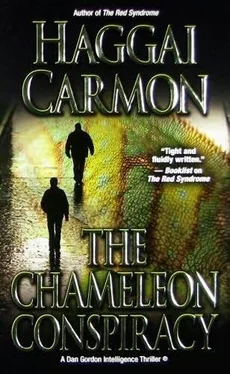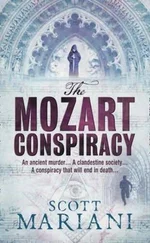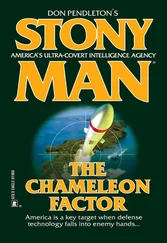Haggai Harmon - The Chameleon Conspiracy
Здесь есть возможность читать онлайн «Haggai Harmon - The Chameleon Conspiracy» весь текст электронной книги совершенно бесплатно (целиком полную версию без сокращений). В некоторых случаях можно слушать аудио, скачать через торрент в формате fb2 и присутствует краткое содержание. Жанр: Триллер, на английском языке. Описание произведения, (предисловие) а так же отзывы посетителей доступны на портале библиотеки ЛибКат.
- Название:The Chameleon Conspiracy
- Автор:
- Жанр:
- Год:неизвестен
- ISBN:нет данных
- Рейтинг книги:5 / 5. Голосов: 1
-
Избранное:Добавить в избранное
- Отзывы:
-
Ваша оценка:
- 100
- 1
- 2
- 3
- 4
- 5
The Chameleon Conspiracy: краткое содержание, описание и аннотация
Предлагаем к чтению аннотацию, описание, краткое содержание или предисловие (зависит от того, что написал сам автор книги «The Chameleon Conspiracy»). Если вы не нашли необходимую информацию о книге — напишите в комментариях, мы постараемся отыскать её.
The Chameleon Conspiracy — читать онлайн бесплатно полную книгу (весь текст) целиком
Ниже представлен текст книги, разбитый по страницам. Система сохранения места последней прочитанной страницы, позволяет с удобством читать онлайн бесплатно книгу «The Chameleon Conspiracy», без необходимости каждый раз заново искать на чём Вы остановились. Поставьте закладку, и сможете в любой момент перейти на страницу, на которой закончили чтение.
Интервал:
Закладка:
“Did they say what their interest is?”
“They just said that we had a mutual interest, but didn’t specify.”
“Benny told me yesterday about their request. Israel has no direct connection, but he still wants to cooperate with us.”
“What? Did he elaborate?” David sounded surprised.
“He told me that the Chameleon is an Iranian agent stealing money in the U.S. for a slush fund that finances terrorist organizations. The Mossad intercepted communications between Tehran and someone working for them in Pakistan mentioning Ward’s names, and also mine. So this guy, whoever he is, is on the Mossad’s radar as a terror financier. That made him a Mossad target.”
“Be careful, Dan,” said David in a fatherly tone. “One of these days questions could be raised. Just be careful.”
“I am,” I said. “I think my informal contact with the Mossad through Benny is invaluable for us. It has always been.”
“I’m sure of that. But for the sake of transparency, why don’t you make a written record of each of your meetings, and send me a copy for the file.”
“David, would you have me fill out a report every time I meet up with a buddy? What is this, East Germany circa 1980?”
“Dan, don’t take it to an extreme. You aren’t meeting with your buddy. You’re meeting with a high-ranking executive of a foreign-intelligence service. Although the Israelis are our close allies, still, any contact between a federal employee and foreign agents must be reported. These are the rules. Besides, believe me, it’s also for your own good.” I knew he was right, of course, and in the past, each time a meeting with Benny was more than just friendly and touched sensitive issues, I’d always written a memo to the file.
I asked David about my TDY to the CIA. I didn’t even know whether the task force would be an internal CIA ad hoc group, or a multiagency group that included representatives from other government agencies. The distinction was critical, because in the latter case, each representative ranked equally with the others and took instructions from his or her own agency. However, in an internal CIA working group, I’d be subject to their directives, and David would remain in the background.
“You won’t be working for me. It’s for the CIA, as in the previous cases.”
“You mean Eric Henderson again?” My tone must have revealed my reservations. Eric and I were never cuddle buddies; in fact our relationship was sulfurous at best.
“No. There’s another guy, Casey Bauer. Try to be nice to him, for a change.”
“I’m always nice!”
David laughed.
I returned to my hotel. Benny called me a few minutes after I entered my room. “Hi Dan. Any news?”
I felt a bit uncomfortable. Benny was always one step ahead of me. Or was it more than one? For a moment it flashed through my mind: Good thing this guy is my friend, you sure wouldn’t want him as your enemy.
“Nothing yet,” I said. “But you know how the fucking bureaucracy works. Give them time.” I hadn’t yet heard what my new CIA boss would have to say about cooperating with the Mossad. He might not be exactly thrilled about it.
Two days later, on a breezy morning with cloudy skies, I drove to Ben Gurion Airport just outside Tel Aviv, returned my rented car, and boarded flight LY 324 to Charles de Gaulle International Airport in France, twenty miles north of Paris. We landed at five thirty in the afternoon. A boyish, athletic-looking man in his early thirties approached me at the gate.
“Mr. Gordon?” I nodded. “I’m Matt Kilburn.”
“Please show me an ID,” I asked cordially, but firmly. He showed me his U.S. passport.
“OK,” I said. “Where do we go?”
“First, please give me your passports.”
“Why?” I asked.
“You’re getting a new one. I’m sending your old passport back to your office in New York by diplomatic pouch.” He handed me a sealed envelope with a new U.S. passport and an Arizona driver’s license. Both carried my picture, with my new name, Anthony P. Blackthorn. I gave him my official government employee’s passport and my personal passport, and walked with him through immigration and customs. Within twenty minutes we were outside the terminal building in a Peugeot 607 driven by a young blonde woman who couldn’t have been a day older than twenty-six.
“Hi,” she said as I sat in the back seat. “Welcome to Paris.”
“Glad to be here. Where are we going?”
“To a nice place, I can assure you.”
There was no point in asking any further questions. Having been a frequent visitor to France, I couldn’t help but notice that we weren’t going to Paris. As we entered the A13 highway, the car turned north toward Rouen, instead of south.
Twenty minutes passed in complete silence while I looked at green fields and busy rush-hour traffic. I saw an Exit 14 sign to Vernon and Giverny, and the car took the exit. I remembered the name Giverny. This village, in the gateway to Normandy, was for many years the home of Claude Monet, the French Impressionist. We passed a bridge over the Seine and three miles later we entered the village. Many tourists were walking in the streets, particularly on rue Claude Monet, where a simple sign directed the visitors to Fondation Claude Monet, his home and garden. Approximately one hundred yards down the road, I saw the Musee d’Art Americain Giverny.
I could no longer hold back. “Is that where we are going?” I asked. “To these museums?”
“I wish,” said the blonde female at the wheel. “But I’m sure you’ll have an opportunity to visit these places. They are nothing short of magnificent.” She pointed to the Musee d’Art Americain as we passed it. “This museum presents American Impressionist paint ers influenced by Claude Monet. I think they are affiliated with the Terra Museum, near Chicago.”
“So where are we going?” I asked again.
“To a small, nearby chateau.”
The car turned into a small village road, and ten minutes later I saw the castle. It was spectacular.
“This is it,” said the woman. “An eighteenth-century chateau.” The castle was surrounded by many acres of park, with a pond and trees. The landscape seemed taken out of the paintings of Watteau, the French rococo artist.
She stopped our car at the circular driveway. I got out and entered the chateau. On the right, connected to a spacious foyer on the ground floor, was a huge dining room with an ancient parquet floor and big windows looking out on the extensive gardens. An adjacent room was a winter garden, full of flower-pots and soft-colored couches.
“Hello, Mr. Blackthorn,” said a prim, very proper sort of man in his early seventies. His white mustache was impeccably trimmed, and his black jacket beautifully tailored. “I’m M. Bellamy, and I’ll be your host during the convention. Please let me show you to your room.”
I followed him up the marble stairs to what Europeans call the first floor and into a large room that had an elegant mahogany bed, night table, easy chair, and small desk. Another door led to a small bathroom. There were no telephones or television in my room.
“If you need anything, please let me know,” he said in French-accented English. “Dinner will be served at eight o’clock.”
Nothing but envy crossed my mind when I saw the accommodations. That’s what happens when your agency has a generous, nonpublic bud get. Compared to my office’s bud get that is cut every year, while the workload increases…David never stopped reminding me of that.
I went downstairs dressed casually for dinner. I opened the dining room door and was stunned. There were ten or twelve people seated, all dressed up-jackets, ties, the works. I stood shameful in my jeans and sneakers. I quickly turned around and returned to my room to change into my only blazer and white shirt, but I didn’t even have a presentable tie. During a dinner in Tel Aviv I had stained the only one I’d packed. When I’d left the U.S. three weeks before for Pakistan, I’d brought nothing but light and casual clothes suitable for a hot climate. However, they were obviously inappropriate for a fancy chateau in Europe in October.
Читать дальшеИнтервал:
Закладка:
Похожие книги на «The Chameleon Conspiracy»
Представляем Вашему вниманию похожие книги на «The Chameleon Conspiracy» списком для выбора. Мы отобрали схожую по названию и смыслу литературу в надежде предоставить читателям больше вариантов отыскать новые, интересные, ещё непрочитанные произведения.
Обсуждение, отзывы о книге «The Chameleon Conspiracy» и просто собственные мнения читателей. Оставьте ваши комментарии, напишите, что Вы думаете о произведении, его смысле или главных героях. Укажите что конкретно понравилось, а что нет, и почему Вы так считаете.












